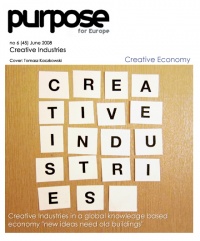
Feature
Labour Market in Polish Creative Industries
We are also going to create favourable conditions for the development of creative industries, because they are like that now, and for creative sector’ – this is a quotation from the policy statement of the current Prime Minister. We are not surprised with this statement at all, especially that creative industries are on top all over the world and the value of global export in creative sectors increased by almost 100% in the years 1996-2005!
Before conducting a detailed analysis of employment in this sector, it is worth taking into consideration one more issue. It is very comforting that at least one element of the term is frequently used (sometimes even seems to be overused) in the context of labour market in our country. ‘Creativity’ is one of the skills (together with such skills as communication skills, team work and flexibility) most frequently mentioned in job advertisements, not neccessarily applying to positions in creative industries sector. This is because our businessmen realise that creativity generates new ideas and therefore, improves the competitiveness of the company. That is why, in the recruitment process they unconsciously (or maybe consciously!) put special emphasis on the quality which is cosidered to be a virtue and a domain of artists, exceptional individuals, accomplished people. Creativity, seen as a skill of searching for untypical, sometimes even absurd solutions – is thus a very desired quality of potential employees. Possibly, this situation results from greater awareness of the employers of the fact how valuable innovativeness and creativity of all types of products and services are.
The term ‘creative industries’ itself does not function in Poland in such a wide range as it could be desired. According to the UK Government Department for Culture, Media and Sport, it means ‘those branches of industry which are based on individual creativity, skills and talent and which are capable of producing riches and work places through generating and making use of intellectual property’. This definition applies to eleven sectors of creativity – advertising; architecture; arts market (including restaurants of artistic works of art); crafts; design; fashion; film; video; photography; software; computer games and electronic publishing; music; theatre; dance; publishing; television and radio.
And how does the situation on the labour market in these branches look like – is it the employee’s or the employer’s market? According to the report ‘Specialist labour market in the second quarter of 2008’ published on the website Pracuj.pl, at that time it was fairly easy to find a job in Construction and Real Estate (architecture) and in Telecommunications and Advanced Technologies (software, computer games and electronic publishing). The largest increase in the number of offers in percent in relation to the first quarter applied to FMCG (fast moving consumer foods) and the largest decline applied to Education and Training and Marketing (Advertising). Marketing, PR and Advertising were also most severely affected by the decline in the number of offers according to the departments in the companies.
The report shows that ‘[…] in the second quarter of this year we could speak about the employee’s market in case of the following branches: Telecommunications and Advanced Technologies, Banking, Finance and Insurance; Construction and Real Estate; Heavy Industry and also, to a smaller degree IT; Retail and Sales and Light Industry. The employer’s market was the situation in the following branches: Marketing; Media; Advertising; FMCG; Transportation and Logistics; Pharmaceutical and Chemical Industry; and also Education, Travel and Law’. Looking at it from the perspective of vacancies, currently among the most desired professions in Poland there are no professions connected directly with creative industries! The most desired workers in Poland, according to the research ‘Talent Shortage’ by Manpower company are, among others: drivers, technicians, engineers, sales specialists, hotel and restaurant workers, production operators, manual workers, secretaries and office workers.
Well, creative professions belong to the group, for which education and diploma do not give any guarantee of employment and more often than others are done in the form of freelancing. Very important qualities in this group are experience and skills. However, for sure specialists from such areas as monument renovation, interior design or design in general cannot complain about lack of interest from potential employers / clients.
Finally, it is worth mentioning the event which became a breakthrough for Polish creative industry – several days ago European Games Centre [Europejskie Centrum Gier] was opened – ‘interregional network of co-operative links among the most prominent actors in the video games industry and universities’– what we can read in the official press information of this organisation. Because of it, Małopolskie region, and more extactly Kraków has a chance of acquiring the name of European valley of games, which will make the industry which will develop around this centre require workers mainly from the branches of software and computer games but also from creative sector.
Check the archive

nr 45 June 2008
theme of the issue:
CREATIVE INDUSTRIES
< spis treści
Article
From Editors
Presentation
Creative design
Career in Culture
Media Cluster - interview with Sławomir Fijałkowski and Monika Głowacka, Maja Ruszkowska-Mazerant
Culture industries
Cluster of Culture Industries and Free Time - interview with Paweł Szlachta, Maciej Mazerant
Young culture
Design and Entrepreneurship - interview with Studio Hergebruik, Magazyn Praga and Miejsce gallery; Romuald Demidenko
Feature
Labour Market in Polish Creative Industries - Ewelina Anna Noga





